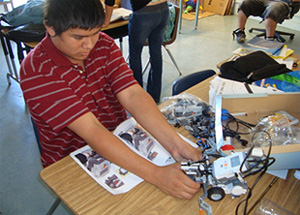Getting Future Scientists and Engineers to the MESA
Math, engineering and science event brings middle and high school students to SDSU.

Cars racing, bridges collapsing and strange objects falling from the sky—this is what MESA Day is all about.
On Saturday, March 6, the MESA Schools Program (Mathematics, Engineering and Science Achievement) will host its annual MESA Day event, giving San Diego County middle and high school students the opportunity to participate in a number of science-based activities and win awards for their performances.
Reinforcing math, science and engineering principles
Their cars are made from mouse traps, bridges are made from popsicle sticks and the falling objects are eggs. While these objects are fun and exciting to make and test, they do double duty by reinforcing math, science and engineering principals for students who are engaged in the MESA Schools Program. After a year of building, planning and testing, students gather in the Engineering building on MESA Day to test their projects and compete in various math, science and engineering competitions.
“This is a time of excitement and accomplishment for our students and many of them will go on to compete in our regional MESA Day competition,” said Michelle Jordan, the academic coordinator for the MESA Schools Program.
Motivating middle and high school students
The MESA Schools Program is a branch of MESA that focuses on motivating middle and high school students to go to college and pursue degrees in mathematics, engineering and science. The statewide program includes approximately 500 students in the San Diego area.
According to Donna Goyer, who directs the program for the SDSU College of Engineering, many of the students in MSP will be first- generation college students.
“The program is designed to inspire students,” Goyer said. “Our goal is to motivate students to want to go to college and make them realize that it’s a possibility.
“(The MESA Schools Program) is a resource for them. The program is highly beneficial to students because the projects they work on are curriculum-based and give them hands-on experience. They realize they actually do need to know and apply concepts like mass, velocity and aerodynamics, and that it is exciting and applies to real life.”
A wide-reaching partnership
The SDSU College of Engineering’s MSP program is integrated into 20 schools in the San Diego Unified School District and the Escondido Union High School and Middle School Districts. Students in the program are exposed to shadowing opportunities, academic field trips and guest speakers from various math, science and engineering fields. Workshops on topics such as financial aid, as well as tutoring in various subjects, are also provided for parents and students involved in MESA.
According to a MESA advisor, many students have trouble comprehending textbooks, but the hands-on projects students complete with MESA enable them to make the connection between theory and application, and gives them the opportunity to apply what they are learning in class.
SDSU students also become involved in the program as tutors and mentors. For example, mechanical engineering senior Elzy Ocampo has worked as an MSP tutor for the past two years and enjoys helping students become more aware of what they can accomplish with math and science.
“I have always enjoyed working with kids. It is a great feeling of accomplishment when a student tells you they have decided to become an engineer,” Ocampo said. “Many of the students I have worked with have decided to go on to college and pursue a degree in science or engineering thanks to participating in MESA.”
So, if you see eggs dropping, cars racing and planes falling from the sky on Saturday, March 6, it is likely you are watching a budding scientist, mathematician or engineer working on their first project thanks to the efforts of the College of Engineering, the MESA Schools Program, industry supporters and the many SDSU tutors, volunteers and mentors that work to make the program a success.



